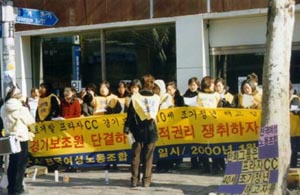The Korean Women's Trade Union (KWTU, headed by Choi Sang Lim) celebrated its second birthday on August 29.
Established with the goal of "organizing women workers by overcoming the limitations of existing labor unions," the KWTU held a forum on its second birthday entitled "Methods of Women-Friendly Organization for Woman Empowerment." Through this forum, the KWTU proposed that different and more women-friendly organization methods are needed in approaching women workers.

"If I was told from the beginning about what a union is like, I wouldn't have joined one. But theirs was a human approach that appealed to me. They treated me like a younger sister and talked to me about all sorts of things, things that have nothing to do with the labor union. And that is why I found it much easier to feel comfortable about the union."
The KWTU says that the one-on-one approach is effective in getting women to participate in union activities. This means placing more importance in acknowledging each person's individuality before regarding someone as part of a group.
To this end, the KWTU focuses on a variety of small group activities. For women who have little experience speaking before a large audience, small groups are good opportunities to express their thoughts and feelings freely.
Each small group assigns to every member a role in operating the group, making the group a democratic and horizontal organization. In such a system, the women voluntarily look for activities they can enjoy, creating opportunities for discovering their own potential.
Through it all, the women become closer and open up to each other, and instead of separating union activities and their personal lives, they start to share their everyday lives with each other. Through this form of 'life-sharing,' the women can find official solutions to their personal problems.
Another important aspect of the union is activities that allow women to participate together with their children. Many women's unions are helping to lighten the women's burden of childcare by having members take turns baby-sitting or hiring a professional kindergarten teacher to look after the kids when all the members have to be at a union meeting.
Each union branch offers programs to keep the kids entertained during training camps and picnics so that members can bring along their kids to these activities.
When the KWTU first started out, it faced opposition from some unionists who said that "the problems of women workers in casual employment can be solved within existing industry- or region-specific unions." However, the KWTU has shown that women unions form an effective framework for organizing women workers. The KWTU is more than just a good model of women-friendly organization. Given the fact that most women workers are casual employees who have to change jobs frequently, a single nationwide women-specific union is more effective in relating to them. In fact, the KWTU has succeeded in putting issues such as irregular employment, minimum wages and dispatch workers on the social agenda by listening to its members' real-life experiences.
The KWTU started out in 1999 with 6 regional branches and 400 members. Its membership has grown to 1,500, of which 71.8% are irregular workers and 71.2% married women. The majority of the members are in their thirties or older.
President Choi Sang Lim says that "the organization has a fluid structure where only 20~25% of those who sign up actually stay on as union members." In order to solve this problem, Choi forecasts that in the mid- and long-term, "the union has to develop its role as mutually beneficial organization that can help union members through job training, job searching and so on."

